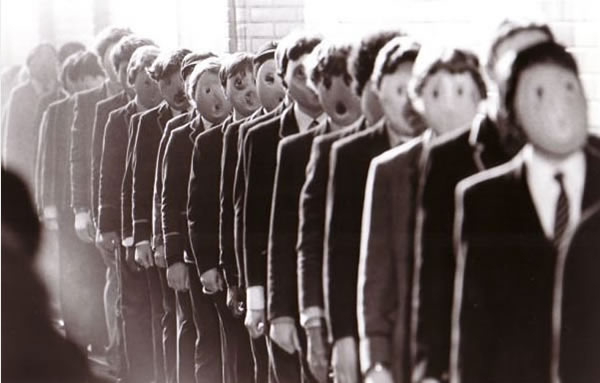
“Who Are You?” is an ongoing series that asks members of Culture on the Edge to reflect on one of their own many identities (whether national, gendered, racial, familial, etc.), theorizing at the same time the self-identification that they each chose to discuss.
What’s at stake in claiming an academic influence or identity, or in asserting another scholar’s influence or identity? I’ve been accused of being a McCutcheonite before. What precisely is at stake in such an accusation? Why is it, for instance, an accusation rather than a form of praise? With this alleged identity claim, what is being accomplished?
On the one hand, clearly I’m a McCutcheonite in the banal sense that his work has influenced my own—and therefore I’m a McCutcheonite in the same sense that I’m also a Marxist, a Durkheimian, a Foucauldian, a Bourdieuean, a Derridean, a Butlerian, a (Wendy) Brownian, and so forth. Claiming an academic influence in this way is rather trite, however; it is just to suggest that some of the things that McCutcheon has written have theoretically informed my own writing projects. Such a claim doesn’t assert a strict identity; while Durkheim’s work has influenced my own work in a wide variety of ways, of course this by no means implies that I’m a slavish follower of Durkheim, incapable of my own thought or from whom I can never dissent. In fact, I have points of disagreement with all of the names above—there are many things Marx, Butler, and McCutcheon have said with which I am not in complete agreement. Presumably this is to be taken for granted—Lacan may have been a psychoanalyst but few would argue that he could not, by situating himself in Freud’s intellectual tradition, depart from Freud’s theory in any way. Rather, as almost everything Derrida wrote was at pains to demonstrate, claiming an influence is always and necessarily to signal indebtedness and departure simultaneously.
But what about the accusation that I’m a McCutcheonite? I’m guessing that what’s implied when others assert that I’m a McCutcheonite is not that his work has enjoyed some influence on my own, but rather that perhaps I’m an automaton incapable of thinking for myself — as if Russ had an educational assembly line and I’m just another brick in the wall. In such cases I gather that the accusation is intended as damning. When I’m dismissed as a McCutcheonite, my work need not be read on its own — for presumably my work does not depart from McCutcheon’s. On the contrary, whatever one assumes about McCutcheon (perhaps from having read only his first book, Manufacturing Religion, or perhaps from one essay or one conference encounter) can be projected onto me as well. The messy work of actually reading what I have to say — and, for instance, comparing and contrasting it with the work of scholars who’ve influenced me — need not be undertaken. Perhaps all you need to know about Lacan is that he was a Freudian, and if you didn’t like Freud then there’s nothing new to learn from Lacan.
In addition, I gather that “McCutcheonite” additionally serves practically as an insult, a pejorative label like “Nazi” or “commie.” McCutcheon’s work has called into question a number of sacred cows in religious studies — the concepts of “religion,” “faith,” “experience,” “authenticity,” etc. — and I gather that dismissing someone as a McCutcheonite is a way of steering clear of such criticisms, perhaps in order to secure the status quo or continue going about scholarship in the usual way. (One wonders why anti-reductionists would reduce me to being a McCutcheonite if that is, in fact, a label I might contest.)
The scholars here at Culture on the Edge share a set of theoretical agendas, but—as with all social formations—there are necessarily differences suppressed for the sake of the shared interests. The presentation of us as homogeneous—either by we ourselves or by our opponents—is a mythmaking endeavor for the sake of some set of short term or long term goals. We are, however, no more homogeneous than all “women” or all “Muslims” are homogeneous. If that is the case, however, whose interests are served by the assertion that we’re a homogeneous bunch? What do we gain by presenting ourselves as a united front? What do others gain by presenting us as a united front and then dismissing us out of hand?
I suppose I am/am not a McCutcheonite. I’ll accept/contest the label depending on the context of the accusation.

Reminds me of the time I was called “a vulgar Smithian” or the time, more recently, I was called a priest of the Canadian sect that worshiped Jonathan Z. Smith. Tremendous compliments, I think, that people try to dismiss ones work in this way, for it indicates that they have no argument, no persuasive rhetoric to fall back on, no rational critique, and, instead, all they can do is call you names. This suggests to me exasperation on their part, in the face of a critique they can’t answer, so the best they can do is shout back, “Oh yeah….?!”
I think it is possible to study the construction of a sub-group of academics as an intellectual exercise in itself, to consider its influence on other sub-groups in a their field, and to analyze how they view themselves in relation to prior, present, and possibly future mainstream positions. It’s all data for a critical thinker.
Maybe later.